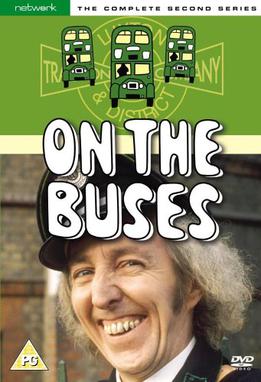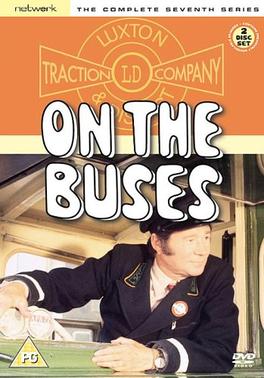A British sitcom or a Britcom is a situational comedy programme produced for British television.
Chesney and Wolfe, were a British television comedy screenwriting duo consisting of Ronald Chesney and Ronald Wolfe. They were best known for their sitcoms The Rag Trade, Meet the Wife (1963–66), On the Buses (1969–73) and Romany Jones (1972–75). When their partnership began in the mid-1950s, Chesney was already known to the public as a harmonica player.

Randall and Hopkirk (Deceased) is a British private detective television series, starring Mike Pratt and Kenneth Cope respectively as the private detectives Jeff Randall and Marty Hopkirk. The series was created by Dennis Spooner and produced by Monty Berman, and was first broadcast in 1969 and 1970. In the United States, it was given the title My Partner the Ghost.
Irwin Allen was an American film and television producer and director, known for his work in science fiction, then later as the "Master of Disaster" for his work in the disaster film genre. His most successful productions were The Poseidon Adventure (1972) and The Towering Inferno (1974). He also created and produced the popular 1960s science-fiction television series Voyage to the Bottom of the Sea, Lost in Space, The Time Tunnel, and Land of the Giants.

On the Buses is a British television sitcom that was broadcast on ITV from 1969 to 1973. It was created by Ronald Chesney and Ronald Wolfe, who wrote most of the episodes. It spawned three spin-off feature films and a stage version. Despite the writers' previous successes with The Rag Trade and Meet the Wife with the BBC, the corporation rejected On the Buses, not seeing much comedy potential in a bus depot as a setting. The comedy partnership turned to Frank Muir, Head of Entertainment at London Weekend Television (LWT), who loved the idea; the show was accepted, and despite a poor critical reception became a hit with viewers.

Michael Anthony Robbins was an English actor and comedian best known for his role as Arthur Rudge in the TV sitcom and film versions of On the Buses (1969–73).

Compact is a British television soap opera shown by BBC Television from January 1962 to July 1965, created by Hazel Adair and Peter Ling.

Ann Harrison McCall, professionally known as Anna Karen, was a British actress best known for playing Olive Rudge in the ITV sitcom On the Buses from 1969 to 1973 including its film spin-offs and stage version and Aunt Sal in the BBC soap opera EastEnders on a recurring basis from 1996 to 2017. She also reprised the role of Olive Rudge in The Rag Trade from 1977 to 1978, while her film roles included parts in two Carry On films: Carry On Camping (1969) and Carry On Loving (1970).

Casanova '73 is a British sitcom broadcast on BBC1 in September and October 1973. Written by Ray Galton and Alan Simpson, the series starred Leslie Phillips as wealthy womaniser Henry Newhouse.

Yus, My Dear is a British sitcom that ran for nineteen episodes over two series in 1976 featuring Arthur Mullard and Queenie Watts in the lead roles. It was written by Ronald Chesney and Ronald Wolfe, and produced and directed by Stuart Allen for London Weekend Television. It was screened by ITV during 1976, and marked an early regular TV appearance of the comedian Mike Reid.

On the Buses is a 1971 British comedy film directed by Harry Booth and starring Reg Varney, Doris Hare, Michael Robbins, Anna Karen, Stephen Lewis and Bob Grant. It was the first spin-off film from the TV sitcom On the Buses and was followed by two further films, Mutiny on the Buses (1972) and Holiday on the Buses (1973).

Mutiny on the Buses is a 1972 British comedy film directed by Harry Booth and starring Reg Varney, Doris Hare, Michael Robbins, Anna Karen, Stephen Lewis and Bob Grant. It was produced by Ronald Chesney and Ronald Wolfe for Hammer Films. The film is the second spin-off film from the TV sitcom On the Buses and succeeded On the Buses (1971). It was followed by a third film, Holiday on the Buses (1973). Mutiny on the Buses came 17th in the 1972 box office.

Holiday on the Buses is a 1973 British comedy film directed by Bryan Izzard and starring Reg Varney, Doris Hare, Michael Robbins, Anna Karen, Stephen Lewis and Bob Grant. It was produced by Ronald Chesney and Ronald Wolfe for Hammer Films, and is the third and final spin-off film from the ITV sitcom On the Buses. It succeeded the films On the Buses (1971) and Mutiny on the Buses (1972). A fourth film was planned but cancelled.
The Men from the Ministry is a British radio comedy series broadcast by the BBC between 1962 and 1977, starring Wilfrid Hyde-White, Richard Murdoch and, from 1966, when he replaced Hyde-White, Deryck Guyler. Written and produced by Edward Taylor with contributions from John Graham, and with some early episodes written by Johnnie Mortimer and Brian Cooke, it ran for 13 series, totalling 145 half-hour episodes and two specials. A further 14 episodes were made by the BBC Transcription Service in 1980 but never broadcast in the UK, until 2012 on BBC Radio 4 Extra. Versions were made by Yle in Finland, Sveriges Radio (SR) in Sweden, and Springbok Radio in South Africa, where it was made into a feature-length film.

The first series of On the Buses originally aired between 28 February 1969 and 11 April 1969, beginning with "The Early Shift". The series was produced and directed by Stuart Allen. The designer for the first three episodes was David Catley, and Andrew Gardner for the rest of the episodes. All the episodes in this series were written by Ronald Chesney and Ronald Wolfe.

The second series of On the Buses originally aired between 31 May 1969 and 5 July 1969, beginning with "Family Flu". The series was produced and directed by Stuart Allen, and the designer was Andrew Gardner. All the episodes in this series were written by Ronald Chesney and Ronald Wolfe.

The fourth series of On the Buses originally aired between 27 November 1970 and 21 February 1971, beginning with "Nowhere to Go". The series was produced and directed by Stuart Allen and designed by Alan Hunter-Craig. All the episodes in this series were written by Ronald Chesney and Ronald Wolfe.

The fifth series of On the Buses originally aired between 19 September 1971 and 26 December 1971, beginning with "The Nursery". The series was produced and directed by Derrick Goodwin and designed by Alan Hunter-Craig. All the episodes in this series were written by Ronald Chesney and Ronald Wolfe except for episodes thirteen and fourteen which were written by Bob Grant and Stephen Lewis.

The sixth series of On the Buses originally aired between 20 February 1972 and 2 April 1972, beginning with "No Smoke Without Fire". The series was produced and directed by Derrick Goodwin for episodes one, four and six and Bryan Izzard for the other episodes. The series designer was Alan Hunter-Craig. Episodes one, three, four and five were written by Bob Grant and Stephen Lewis. Episodes two, six and seven were written by George Layton and Jonathan Lynn.

The seventh and final series of On the Buses originally aired between 26 February 1973 and 20 May 1973, beginning with "Olive's Divorce". The series producer and director was Bryan Izzard. Various people wrote the episodes of this series. Arthur Rudge never appears in this series and Stan Butler only appears until halfway through the series.
















